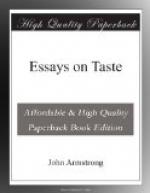One doats on Horace, or on Hudibras?
’Tis cruel, Sir, ’tis needless, to endeavour
To teach a sot of Taste he knows no flavour, 90
To disunite I neither wish nor hope
A stubborn blockhead from his fav’rite fop.
Yes—fop I say, were Maro’s self before ’em:
For Maro’s self grows dull as they pore o’er him.
But hear their raptures o’er
some specious rhime
Dub’d by the musk’d and greasy
mob sublime. 96
For spleen’s dear sake hear how
a coxcomb prates
As clam’rous o’er his joys
as fifty cats;
"Music has charms to sooth a savage
breast,
To soften rocks, and oaks"—and
all the rest: 100
"I’ve heard"—Bless
these long ears!—“Heav’ns what
a strain!
Good God! What thunders burst in
this Campaign!
Hark Waller warbles! Ah! how sweetly
killing!
Then that inimitable Splendid Shilling!
Rowe breathes all Shakespear here!—That
ode of Prior 105
Is Spencer quite! egad his very fire!—
As like”—Yes faith! as
gum-flowers to the rose,
Or as to Claret flat Minorca’s dose;
As like as (if I am not grosly wrong)
Erle Robert’s Mice to aught e’er
Chaucer sung. 110
Read boldly, and unprejudic’d
peruse
Each fav’rite modern, ev’n
each ancient muse.
With all the comic salt and tragic rage
The great stupendous genius of our stage,
Boast of our island, pride of human-kind,
115
Had faults to which the boxes are not
blind.
His frailties are to ev’ry gossip
known:
Yet Milton’s pedantries not shock
the town.
Ne’er be the dupe of Names, however
high;
For some outlive good parts, some misapply.
120
Each elegant Spectator you admire;
But must you therefore swear by Cato’s
fire?
Masques for the court, and oft a clumsey
jest,
Disgrac’d the muse that wrought
the Alchemist.
“But to the ancients.”—Faith!
I am not clear, 125
For all the smooth round type of Elzevir,
That every work which lasts in prose or
song,
Two thousand years, deserves to last so
long.
For not to mention some eternal blades
Known only now in th’ academic shades,
130
(Those sacred groves where raptur’d
spirits stray,
And in word-hunting waste the live-long
day)
Ancients whom none but curious critics
scan,
Do, read[A] Messala’s praises if
you can.
Ah! who but feels the sweet contagious
smart 135
While soft Tibullus pours his tender heart?
With him the Loves and Muses melt in tears;
But not a word of some hexameters.
“You grow so squeamish and so dev’lish
dry,
You’ll call Lucretius vapid next.”
Not I. 140
Some find him tedious, others think him
lame:




